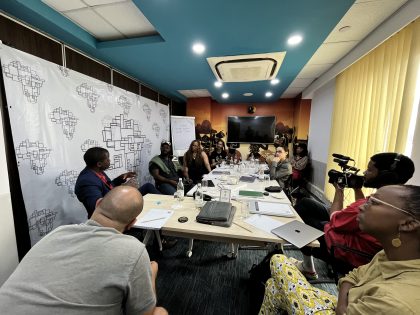
We must learn to sit in the dark together
At our first workshop from our festival in Nairobi, The Elephant’s Joe Kobuthi, reflected on a year since #EndFinanceBill.
15 Article(s) by:
Sa'eed Husaini is research fellow at the Center for Democracy and Development in Abuja, Nigeria, and a regional editor for Africa Is a Country.

At our first workshop from our festival in Nairobi, The Elephant’s Joe Kobuthi, reflected on a year since #EndFinanceBill.

As the pink tide swept through Latin America, Africa’s neoliberal regimes held firm. Where is Africa’s rupture —and what explains the absence of a sustained left challenge?

As global powers debate alternatives to the dollar, Nigerian traders, Chinese exporters, and everyday crypto users are already reshaping the rules of currency exchange, as the hosts of the Nigerian Scam find out in the latest episode of the AIAC podcast.

Once anchored in mass struggle and socialist politics, the feminist movement in Nigeria now navigates the contradictions of donor dependency, digital activism, and elite capture. On the podcast, we unpack: what happened?

On the podcast, we explore: How did Ghana go from Nkrumah’s radical vision to neoliberal entrenchment? Gyekye Tanoh unpacks the forces behind its political stability, deepening inequality, and the fractures shaping its future.

Nigeria and South Africa have a fraught relationship marked by xenophobia, economic competition, and cultural exchange. The Nigerian Scam are joined by Khanya Mtshali to discuss the dynamics shaping these tensions on the AIAC podcast.

When Africa’s richest man announced the construction of the continent’s largest crude oil refinery, many were hopeful. But Aliko Dangote has not saved Nigeria. The Nigerian Scam returns to the Africa Is a Country Podcast to explain why.

Nigeria’s archives of revolutionary printmaking offers us insights into the dissident voices of the country’s old left, which are surprisingly relevant today.

Caught between pro-West loyalists and anti-West populists, West Africa’s regional bloc has come apart.

Despite liberalizing the economy to the detriment of the majority, Nigeria’s president has faced little opposition in his first year in office.

Buharism, the social and economic outlook of Nigeria’s outgoing president, did not seek an alternative to neoliberal globalization, but sought to consolidate Nigeria’s place in it.

Peter Obi, one of the three main candidates for Nigerian president, is neither a savior nor a socialist, but his candidacy and his supporters have enlivened Nigerian elections.

While Nigeria’s class divide is not between rich whites and poor blacks, it still has a lot in common with postapartheid South Africa.

Omoyele Sowore was the presidential hope of Nigeria’s more active left. He fared abysmally. What next for progressive electoral politics in Nigeria?

What has the world’s Moët drinking capital and a world leader in global indices of private jet ownership to do with left politics?